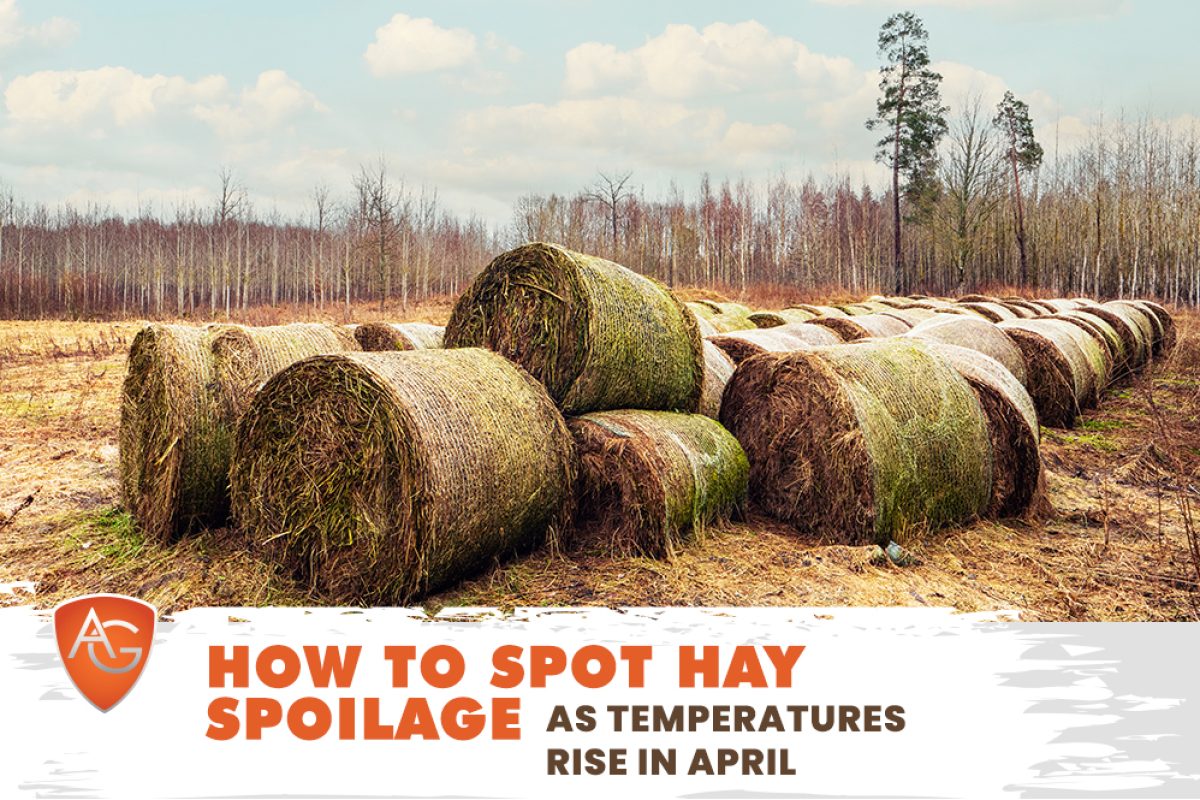Overview: As temperatures rise in April, hay spoilage becomes a serious concern. Learn how to spot mold, heat buildup, and discoloration early to protect your livestock and prevent feed waste.
April marks the start of warmer days in Laramie County, Wyoming, and Northern Colorado, bringing new challenges for ranchers and livestock owners. One major concern during this seasonal shift is hay spoilage. As temperatures rise, excess moisture, improper storage, and humidity fluctuations can lead to mold growth, fermentation, and nutrient loss — posing serious health risks to livestock.
Being proactive about hay quality ensures that your cattle, horses, and other livestock get the best nutrition without exposure to harmful toxins. Let’s break down how to identify signs of spoilage and how to protect your hay supply in the changing spring weather.
Signs Your Hay Might Be Spoiling
Unusual or Musty Odors : High-quality hay has a fresh, sweet, and grassy smell. If you notice a musty, sour, or ammonia-like odor, it’s a red flag. These smells indicate that the hay is fermenting or harboring mold, both of which can reduce its nutritional value and harm livestock.
Discoloration & Mold Growth : Visually inspect your hay bales. Good hay retains a rich green or golden color, depending on the type. However, dark brown, gray, black, or white patches suggest mold growth or heat damage. Moldy hay is particularly dangerous for horses, as it can cause respiratory issues like heaves, a chronic lung condition.
Excessive Dust : While some dust is natural, an unusual amount—especially if it’s gray or white — can be a sign of mold spores. Mold-contaminated hay can lead to digestive problems in cattle and horses, so it’s crucial to inspect closely before feeding. If you shake a bale and see a fine dust cloud, it might not be safe for livestock.
Heat Buildup in Bales : Hay that feels warm to the touch when you reach into a bale is likely fermenting due to trapped moisture. This process not only reduces the protein and fiber content but also increases the risk of spontaneous combustion—a major hazard in barns and hay storage facilities.
Damp or Clumpy Texture : Hay should have a crisp but slightly flexible feel. If it’s damp, sticky, or clumped together, there’s likely excess moisture inside. This speeds up spoilage and can encourage bacteria and mold growth.
>> Related Reading: What Are Some Visual Signs That a Bale of Hay is of Poor Quality?
Preventing Hay Spoilage in Laramie County & Northern Colorado
Spring weather can be unpredictable, with sudden temperature swings and rain showers affecting hay quality. Here’s how to keep your hay in top condition:
Store Hay Properly: Keep bales in a dry, well-ventilated area, off the ground, and covered to reduce moisture absorption. Hay barns or shelters with good airflow work best.
Monitor Moisture Levels: Use a hay moisture meter to check bales before stacking. Ideally, small square bales should be below 18% moisture, and large rounds should stay under 20%.
Rotate Your Stock: Always feed older hay first to prevent spoilage in long-stored bales. Avoid stacking fresh-cut hay directly on top of older bales.
Inspect Regularly: Check your hay at least once a week, especially after spring rains or temperature spikes, to catch spoilage early.
Choose Quality Hay: Start with well-cured hay that has been properly baled and stored. All Around Ag supplies high-quality hay in Wyoming and Northern Colorado, ensuring you get fresh, nutrient-rich feed for your livestock.
Protect Your Livestock & Your Investment
Whether you’re feeding cattle, horses, or other livestock, spoiled hay can have serious consequences — from digestive issues to lost feed value. By staying proactive in April and throughout the spring, you can minimize waste and keep your animals healthy.
If you’re looking for top-quality hay in Laramie County, Wyoming, or Northern Colorado, All Around Ag has North Park Timothy Grass, Alfalfa, Orchard/Brome mixes, and more — all properly stored and ready for your livestock.
Contact us today for reliable hay supply and expert advice!
